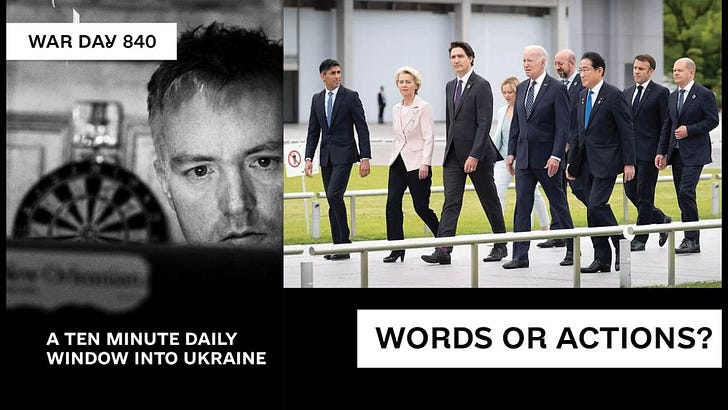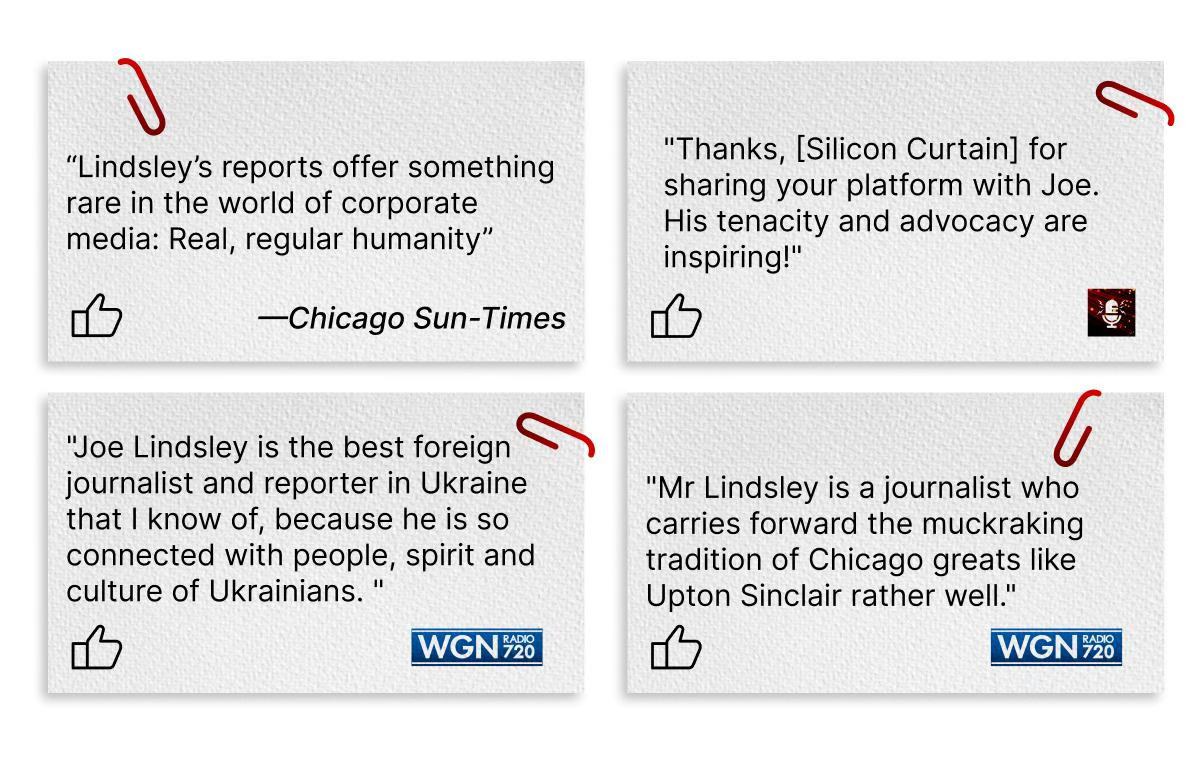Want to know what’s happening in Ukraine? Read on for the real intelligence and mood, from the most informed voices.
TODAY’S HIGHLIGHTS:
Saving Kharkiv: How citizens dodged drones and missiles to save each other
How Ukraine's Civil Society Defies War and Drives Tech Success, While the US Faces Internal Struggles
Major US snack companies gather with Michelle Obama in Chicago, even as they continue to support Russia
UKRAINIAN FREEDOM NEWS: Please consider sustaining us at $10/month in our mission of TRUTH TO THE WORLD & SUPPLIES FOR FREEDOM.
SPECIAL REPORT
Saving Kharkiv
In May, it was hell in Kharkiv city and region. The @KharkivMediaHub team raced to and from the border to evacuate people and pets, even as Russians targeted humanitarian routes and conveys. Here's some of their story.
SILICON CURTAIN — with host JONATHAN FINK in OXFORD
Lesia Dubenko - An Irreverent Look at the Useful Idiot Amplifying Narratives Friendly to the Kremlin
Lesia Dubenko is a political scientist and an alumna of Lund University, with an Msc in European Affairs. She has eight years of experience in political and social journalism and has been published in the Financial Times, Politico Europe, New Eastern Europe, Atlantic Council, KP. In August 2018 she entered the Ukrainian NGO sector, and has been cooperating with different Ukrainian NGOs, including “Europe without Barriers”, “Internews Ukraine”, “European Pravda” and more.
“What puzzles me because okay, he has an agenda, we all get it. Everyone hates him in Ukraine. It's true. The moment somebody hears about Samuel Tar, they go like, no, no, no thanks.”
Key Points:
In Foreign Policy magazine, Samuel Charap sought to normalise Russia's intentions, Dubenka argues. He imposes a good faith negotiation narrative on Moscow, despite evidence of Russia's brutal actions.
Dubenka says Chapa is influential in shaping US foreign policy and expresses concern about the danger and risk of his narratives.
Accepting Ukraine's neutrality as a condition for ending the war would only lead to continued conflict, as Russia has shown no willingness to abide by agreements. [22:33]
Dubenka emphasizes the importance of reading history, seeking multiple perspectives, and not relying solely on so-called experts in foreign policy.
WGN RADIO DAILY WAR JOURNAL — 10 Minutes Daily: Watch, Listen, or Read
War Day 840: Snack Profits Amid Sanctions
The only American news show reporting live from Ukraine EVERY WEEKDAY of Russia’s full-scale invasion; with Bob Sirott in Chicago and Joe Lindsley in Lviv
A Day of Strange Russian Activity
We've had a day of unusual Russian activity. We've had air raid alarms throughout the night throughout the country, and then throughout the day today, the all clear sound, the latest, all clear sound just wad through the skies here over Lviv a few moments ago. And so I'll explain a bit of what happened.
Putin's Peace Posturing: Ukraine's Strength Shifts the Dialogue
There was very little talk of negotiations from the Kremlin a month and a half ago when Russia was pounding Kharkiv city. Kharkiv was incredibly vulnerable while Washington was refusing to give Ukrainians permission to punch back. And once that policy changed, Kharkiv is now safer and calmer compared to what it was a month ago.
And as we see, as we talked about yesterday, Russia has got ships in the Caribbean sea and they're safer there than they are in the Black Sea because Ukrainians have become so adept at destroying any Russian or destroying many Russian ships in the Black Sea. And so I think if we pay attention to when we see the war negotiation coming out of the Kremlin, it's usually during these times when Ukraine is getting stronger and Russia needs to buy itself time.
Play-by-Play of Russian Night Attack
What we saw in the past hours, we had reports at about 11 o'clock last night that Russian bombers were taking off.
And that's always very sinister. You know, have about two hours until missiles start to enter Ukrainian airspace. And indeed they did. There were explosions throughout the country, not so many in the cities, but it seems that the Russians are looking to hit infrastructure targets, whether that's energy or military. And that went on through the whole night.
And then we had about 6:30 in the morning, Russian MiG jets were up in the air, which automatically leads to nationwide air rate alarms throughout Ukraine because those jets carry the hypersonic Kinzhal missile, which can be anywhere in Ukraine in just a matter of minutes. And it seems that at least one of those missiles did go toward kyiv City. But of course, Kyiv is protected by the Patriot Missile Defense system from the US. So it seems it was okay there, but we don't quite know what the Russians were looking for in these past hours.
And what they still seem to be looking for today, I expect we're still going to have more air rate alarms today. It just feels like a day of heavy activity. And the other rockets that the Russians were firing last night are the KH 22. And as a wise observer pointed out, these are fast and heavy, they move very quickly, but they're not precise, which makes them an ideal weapon to hit residential buildings and they're very sloppy weapons. And so that's what Ukrainians had to deal with these past hours.
G7 Meeting: A Confounding Loan
And meanwhile, coming out of the G7, there was some reassuring news that we talked about these $300 billion of frozen Russian assets that the West has. And now with the G7, they've agreed to give Ukraine access to 50 billion of those assets to use for rebuilding. But very interestingly, they're only going to do it as a loan. And this is confusing to me, why not just use it? So it's going to be a loan for Ukraine that one day we'll have to pay these back ostensibly to Russia. So that part doesn't make sense, but at least these funds are being released.
WENDY SNYDER: Alright, and before I let you go, I looked it up. I wasn't sure if people in Ukraine celebrate Father's Day, but they do. What will that look like this weekend?
Father's Day in Wartime:
Ukrainians, they take these holidays seriously, and people in the war, you try to spend time with your family, but think of how many fathers are in the trenches or have been killed during this time. And so I think it'll be a day where the cemeteries will be also busy. And as I walk around Lviv today, for example, you see so many people missing legs. It's just a common sight, the heavy toll and let alone all the lives that are lost.
Snacks for Missiles: Corporate Complicity in Conflict
And I should note as we close out here for the week, this week in Chicago has been this consumer goods form. Michelle Obama was the keynote speaker and it featured some of the major companies, Mondelez, Pepsi, and Mars, sort of snack food companies that still do business in Russia. They make lots of money in Russia, no one's talking about it, but they contribute to the Kremlin's coffers, to some of the weapons that are being lobbed upon Ukraine today is made possible by the revenue and the tax revenue that these companies generate.
And I haven't seen that story covered at all, but that's that conference that's finishing today in Chicago of major companies that they're not breaking sanctions. These are allowable loopholes. So they're not breaking the law, but they're able still to make money in Russia and to contribute to the Kremlin's tax coffers.
Not a word about “denazification” problem. Not a word about “demilitarization” problem. Not a word about the “Kiev Nazi regime” problem. JUST GIVE US YOUR TERRITORY! P.S. And we will be back for all your other territories after a short break... Russia is carrying out a simple imperial military conquest to occupy new territories of Ukraine and then Europe.
Trust and Innovation: How Ukraine's Civil Society Defies War and Drives Tech Success, While the US Faces Internal Struggles
“Genteelly Conservative” is a perfect way of describing the baseline Ukrainian culture, where a strong civil society is based on trust. Such a trust culture yields an innovation culture, as we have seen with Ukraine’s successful tech sector, to which the world outsources even amid a devastating war, and which is leading the way in miltech innovations.
Tsar Putin and even Washington often discounts the “Human Intellectual Capital” value of cultures like Ukraine, once their legacy people’s personal liberties are unleashed. In Ukraine we see this espeically now: they have every motivation to innovate. Putin does not understand, nor do folks like Tucker Carlson seem to appreciate, the “services economy” as it requires trusting people to do the right thing around you— which requires liberty and due process to be sacrosanct.
In Ukraine, when there are no Russian missile attacks, the cities are safe and trusting places. Crime is rare, kids walk to school, parks or shops on their own. You can trust people, which is a remarkable transformation from a society which during Soviet governance was full of distrust and fear. This attitude not only has made the victory effort possible but also great innovation.
How is our trust economy faring in the US? It seems with so many sides pitted against each other we just might be caught up in the thing that Ukraine resists so well: a neo-KGB driven strategy to destroy America’s former competitive advantage in civil society.
Ryan Scott is a graduate of Notre Dame and Columbia Business School. After a decade following Morgan Stanley and other Wall Street firms, he co-founded an institutional investment consulting company that technology and unstructured data to reduce operational risk, mitigate investment costs, and steer pensions away from unforeseen geo-political icebergs.
Three Points to Understand America
Have you seen the scandal about Ukraine’s Texty website? A group of independent journalists in Kyiv published a story analyzing Amerian opposition to Ukraine. The story was not fair: it went too easy on the White House and never mentioned the architect of the slow-roll weapons policy, Jake Sullivan.
But the response to the story in the US has been even more unfair: Some anti-Ukraine people mentioned in the story, such as alleged tough guy Rogan O’Handly aka DC Draino, started crying like a little girl that "Zelenskiy wants to kill me!" simply because some foreign journalists living in a war criticised his lies about Ukraine. And then Elon Musk, astoundingly and reprehensibly, called these journalists "terrorists."
The bad effect of all this is an increasing in misunderstanding among two peoples who deeply believe in freedom: Americans and Ukrainians. I know it's damn tough for Ukrainians: As Russian missiles fall around their heads, they still have to try to convince the world to stand by them!
But that's the reality. If you want American weapons for Ukraine, you need to persuade Americans, which means you need to understand Americans. Russian propaganda I think understands American frustrations well and so it adeptly manipulates them.
UKRAINIAN FREEDOM NEWS: Please consider sustaining us at $10/month.
Regular Resources:
Air-Raid Alert Map
State of the War Map: shows Russian positions and what Ukrainians have taken back; updated daily
Mriya Report: a 24/7 Twitter audio channel featuring the best Ukrainian volunteers and representatives
Follow us across various social media: Instagram, Twitter, Facebook, or via UkrainianFreedomNews.com.











